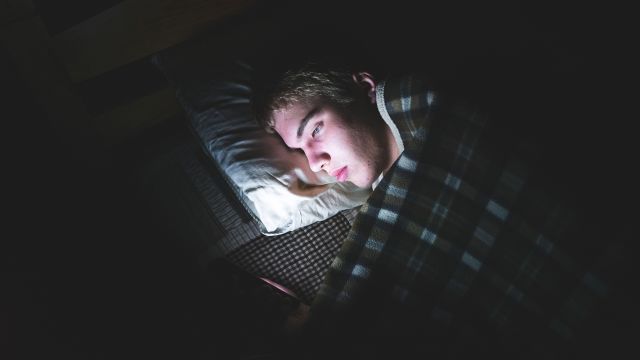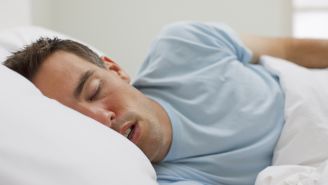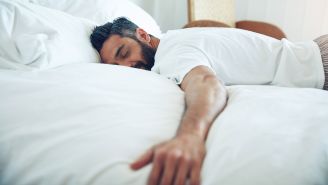Updated on August 2, 2024.
We often skimp on sleep in favor of answering emails, binging on TV, or even waking up early for a workout. But sleep is not a luxury. It’s a necessity, a basic cornerstone of health. In fact, research finds that people who get less than seven hours of sleep a night are at a higher risk of conditions like heart disease, asthma, and diabetes. Less sleep is also linked to a higher risk of depression.
Depression is a common mental illness that influences the way a person thinks, feels, and acts. It can show up as persistent sadness and loss of interest in things you once enjoyed.
If you have depression, getting enough sleep is often challenging. Insomnia is, in fact, one of the hallmark symptoms. But the reverse is also true. Sleep disorders that causes interrupted or reduced sleep—such as obstructive sleep apnea and restless legs syndrome—can also lead to depression. Sleeping more than usual can be a symptom of depression, too. It can be a vicious and unpleasant cycle.
Here’s how difficulty sleeping and depression feed on each other, plus how to know when it’s time to check in with a healthcare provider (HCP).
Sleep disorders and depression are intertwined
If you have both depression and difficulty sleeping, it can be hard to untangle which came first. Either is possible.
Take insomnia, for starters. “Depression and insomnia tend to have substantial overlap,” says Alex Dimitriu, MD, with Menlo Park Psychiatry & Sleep Medicine in California. Insomnia can be a stand-alone condition, but it’s also a symptom of depression. People with depression often wake too early and are not able to get back to sleep, says Dr. Dimitriu.
Insomnia isn’t the only sleep disorder with a strong link to depression. Obstructive sleep apnea and restless legs syndrome can lead to insomnia, and thus may also exacerbate depression.
- Sleep apnea is a condition in which a person’s breathing stops and starts during sleep due to blocked airways. In 2023, a study published in the journal BMC Public Health found that people with sleep apnea were more likely to experience symptoms of depression. Researchers also found that the worse the sleep apnea, the more severe the depression symptoms.
- Restless legs syndrome is characterized by a strong need to move your legs when lying down. A 2022 study published in Movement Disorders found more depressive symptoms and suicidal thoughts among patients with the condition.
Without a good night’s rest, it’s harder to get through the day.
“Lack of sleep can also result in fatigue, decreased energy, impaired memory and concentration, and overall diminished life satisfaction,” Dimitriu says. So, while poor sleep quality won’t necessarily lead to depression, if it happens on a regular basis, it will at least diminish your quality of life.
You spend about a third of your life sleeping, says Dimitriu, so disruptions to those hours are worth investigating and taking seriously.
Four signs you should visit a healthcare provider
Everyone experiences insomnia or a poor night’s rest on occasion. But you should see an HCP if insomnia drags on for months, you’ve tried changing your sleeping habits, and the situation is making it hard to cope with daily life. Another rule of thumb for when it’s time to get medical care: If the problem happens at least once a week for multiple weeks in a row.
Here are more red flags that merit an HCP visit.
You experience the characteristic gasps and snorts of sleep apnea. Obstructive sleep apnea leads you to snore or gasp while sleeping. It also causes you to stop breathing for multiple, brief periods during the night. It typically happens because your airway becomes physically blocked, and is often related to conditions like obesity or large tonsils. There's also a less common form of sleep apnea that occurs because a person's brain fails to send the correct signals to the muscles that control your breathing.
For people with sleep apnea—especially obstructive sleep apnea—breathing typically restarts with a snore, a snort, or a gasp. The frequent disturbances throughout the night make it difficult for a person to sleep soundly, and daytime sleepiness is the result.
Those who have an overbite, or a large neck or tongue, may have an increased risk of sleep apnea. Smokers, people who are overweight, and people who are age 40 or older are also at higher risk.
If you or your partner spot signs of sleep apnea, pay an HCP a visit.
You have difficulty falling asleep and staying asleep. Insomnia is common during times of stress and upheaval, but it can happen for a variety of other reasons. It can arise on its own, or it can be part of other conditions.
Common risk factors for insomnia include:
- Stress, anxiety, and worries
- Poor sleep habits, such as eating late or looking at a smartphone before bed
- An irregular schedule or frequent travel
- Mental illnesses, including depression, anxiety, and post-traumatic stress disorder
- Stimulants, such as the caffeine in coffee, nicotine, or the stimulants in certain cold medications
- Alcohol, which can cause you to wake up in the night
- Inactivity
- Napping
- Chronic pain
- Medical conditions that lead you to get up to urinate during the night
- Older age
- Female sex
- A previous history of insomnia and family history of insomnia
The quality of your sleep matters as much as the duration, points out Dimitriu. Anxiety can lead to what he terms “battlefield” sleep, which is characterized by a struggle to both get—and stay—asleep, with many periods of wakefulness.
But insomnia is treatable. Changing certain sleep habits like your regular bedtime, screen time, and caffeine and alcohol intake may improve the situation. Exercise, relaxation techniques, and cognitive behavioral therapy can also be helpful.
You spend your days feeling sleepy. Are you consistently fatigued? Do drowsiness or low energy levels interfere with your everyday activities? Do you have a hard time concentrating on tasks? Are you tired despite a full night’s sleep? These could all be symptoms of a sleep disorder. But fatigue is also a symptom of depression. Whatever its cause, daytime sleepiness not something to take lightly.
“Excessive daytime sleepiness and sluggishness, or sleepiness while driving, in meetings, or any time during the day should be brought up with your doctor,” Dimitriu says.
Contact an HCP if you’re consistently tired, having a hard time working productively, or making frequent mistakes.
You feel sad and have other signs of depression. There are several other depression-related symptoms besides sleep problems. If you're feeling sad and hopeless, have lost interest in hobbies or passions you once enjoyed, or are struggling to concentrate, then it’s time to see an HCP.
In its most serious form, depression can cause suicidal thoughts. If that's the case with you, call 911 or call, text, or chat the 988 Suicide and Crisis Lifeline at 988.
Use a sleep diary to help diagnose the root cause
Many factors can disrupt sleep, with sleep loss potentially leading to depression. Or depression may be the root of your sleep difficulties. To get started untangling this, keep a sleep diary.
“If something is wrong with your sleep, track your sleep times for about a week or two, and bring it in to your doctor,” says Dimitriu.
You can jot down notes each morning or use the free Sharecare app, available for iOS and Android. This information will help an HCP determine what's at the root of your sleep troubles.






